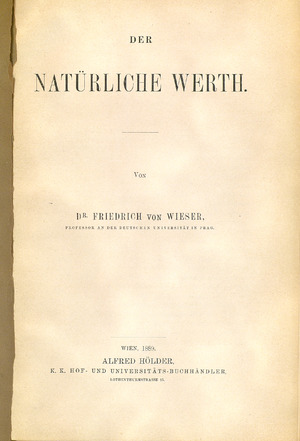Friedrich von Wieser facts for kids
Quick facts for kids
Friedrich von Wieser
|
|
|---|---|
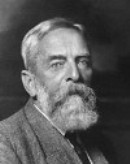 |
|
| Born |
Friedrich Wieser
10 July 1851 |
| Died | 22 July 1926 (aged 75) |
| Nationality | Austrian |
| School or tradition |
Austrian School Lausanne School |
| Alma mater | University of Vienna (Dr. jur. 1872) |
| Influences | Carl Menger Eugen von Böhm-Bawerk |
Friedrich Freiherr von Wieser (10 July 1851 – 22 July 1926) was an important economist from the early Austrian School of economics. He was born in Vienna, Austria. His father was a high official in the war ministry. Friedrich first studied sociology and law.
In 1872, he read a book by Carl Menger, who started the Austrian School. This made Wieser change his focus to economic ideas. He taught at universities in Vienna and Prague. In 1903, he took over from Menger in Vienna. There, along with his brother-in-law Eugen von Böhm-Bawerk, he helped teach the next group of Austrian economists. This group included famous names like Ludwig von Mises, Friedrich Hayek, and Joseph Schumpeter. From 1917 to 1918, he was also the Austrian Minister of Commerce.
Wieser is known for two main books: Natural Value and Social Economics. In Natural Value, he explained the idea of opportunity cost and how value is given to different parts of production. In Social Economics (1914), he tried to use these ideas in the real world. He also helped explain the idea of marginal utility. This is the extra satisfaction you get from one more unit of something. He used the German term Grenznutzen, which became the standard term "marginal utility".
Wieser believed that prices show important information about the market. This information is needed for any economic activity. He also thought that entrepreneurs, who are leaders creating new businesses, were very important for economic change. This idea later influenced Joseph Schumpeter's work on new ideas in economics.
Unlike many other economists from the Austrian School, Wieser did not fully support classical liberalism. He believed that "freedom has to be replaced by a system of order." He wrote about this idea in his last book, The Law of Power.
Contents
His Life Story
Friedrich Wieser was born in Vienna on July 10, 1851. As a young person, he was interested in law, history, and sociology. He started studying law at the University of Vienna in 1868. He became passionate about political economy after reading a book by Herbert Spencer.
After working for the government for ten years, Wieser received a scholarship in 1875. This allowed him to study political economy at Heidelberg University. He studied with Eugen Böhm von Bawerk, who was a childhood friend and later became his brother-in-law. Both Wieser and Böhm-Bawerk were greatly influenced by Carl Menger's book, Principles of Economics (1871). Menger's book inspired them to study economics. These three economists are seen as the first generation of the Austrian School of economics.
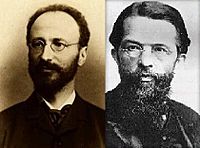
In 1884, Wieser became an associate professor at Charles University in Prague. He stayed there until 1903, when he took over Carl Menger's position at the University of Vienna. In 1889, he became a full professor at Charles University. That same year, he published his book Natural Value. This book started a discussion about how to value the different parts that go into making something. It also introduced two of his main ideas: his value theory and his imputation theory.
Wieser published more works to introduce the ideas of the Austrian School. He also helped edit articles for the Palgrave Dictionary of Economics. In 1903, Wieser became a full professor at his old university, the University of Vienna. There, he taught a new group of economists, including Ludwig von Mises, Joseph Schumpeter, and Friedrich Hayek. He also developed his own ideas about money. In his last 25 years, he focused on sociology. He believed that sociology and economics should work together to understand human society better.
In 1914, Wieser published Theory of Social Economy. In this book, he first used the term "opportunity cost". This is the cost of choosing one thing over another. Some people think his later works don't fully fit with the Austrian School because he was influenced by other economists. Even his student Ludwig von Mises thought Wieser might have misunderstood some core ideas of the Austrian School.
In 1914, Eugen Böhm von Bawerk, his close friend and brother-in-law, passed away. This was a difficult time for Wieser.
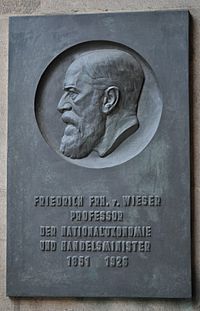
In 1917, Wieser became a member of the Austrian House of Lords and was given the title of Baron. He was also made Minister of Commerce in the Austrian government. He held this job until World War I ended in 1918.
Wieser died on July 22, 1926, in Salzburg, where he is buried. Some of his books were published after he died, including one about his ideas on money.
What He Achieved

Wieser's most famous contributions are his imputation theory and his alternative cost (or opportunity cost) theory. He introduced the term "opportunity cost" in his 1914 book Social Economics. He also helped create the idea of marginal utility, using the German term Grenznutzen.
Wieser also emphasized how important entrepreneurs are for economic change. He saw them as "heroic individuals" who lead the way to new economic opportunities. This idea later influenced Joseph Schumpeter's work on new business ideas. Wieser's ideas on value were groundbreaking because they started a new discussion about economic value. He offered one of the first ways to calculate prices for the different parts of production. His imputation theory improved on his teacher Carl Menger's ideas. It is still used today in microeconomics to study how businesses replace production factors.
Another key idea from Wieser is the alternative cost theory, now called the opportunity cost theory. This idea was not widely known among British economists at the time. Based on the work of Vilfredo Pareto, Wieser developed the ideas of marginal utility and opportunity cost. These ideas helped economists study scarcity and how to use limited resources.
Wieser improved Carl Menger's theory by adding the concept of opportunity cost. This fit well with the idea of marginal utility. He also used Menger's ideas about money to create his own monetary theory. He studied how changes in the value of money can affect the economy.
Wieser's knowledge of sociology helped him combine the Austrian theory of utility with ideas about how institutions develop. He offered solutions to the puzzle of private property and getting the most utility. Wieser believed that traditional economic models often ignored important things like monopolies and economies of scale. He argued that these simple models might not be useful for making economic policy. In his book Theory of Social Economy, he introduced the idea of a "social economy." He used this idea to measure how well government actions worked in the economy.
His Economic Ideas
Wieser's main economic ideas come from his book Natural Value (1889) and Theory of Social Economy (1914). These include his value theory, imputation theory, and alternative cost (or opportunity cost) theory. He also had a monetary theory.
Value Theory
Wieser's value theory tries to find a way to calculate economic value. He said that the parts used in production have value because of how useful they make the final product. This is based on marginal utility. This was different from his teacher Carl Menger's idea. Menger thought the value of a production part was its value when it was added to the final product. Wieser's value theory was presented in his book Natural Value (1889).
Wieser believed that "natural value" is a neutral idea, meaning it doesn't depend on the economic system. He thought that the value of property depends on how income is shared among different social groups. If income is not shared fairly, goods with little social use might have high value, and useful goods might have low value.
He argued that the economy is a social process. It needs to be based on a concept of social economics. This means certain actions by institutions are needed. In his book Theory of Social Economics, Wieser explained his idea of a general economic balance. He wanted to define the conditions where resources would be used to create the highest possible utility. Social economics should be a way to measure how well government actions work in a market economy.
Wieser thought that natural value would exist even in a perfect communist state. This is because there would be no wealth differences or mistakes. In such a state, value would only come from how much is available and from profits. However, he also said that in the real world, natural value is only one part of how prices are formed. Other things that affect prices include how much people can afford to buy, mistakes, fraud, and force.
His idea of natural value shows how the economic value of property changes based on how income is shared. If income is very unequal, luxury goods might be highly valued while essential goods for the poor are not. Wieser explained when the exchange value (price) is different from the real value (marginal utility):
- Monopolies: If one company controls a market, it can increase its own profit at the expense of what is good for society. Wieser argued that competition can fix this by reducing the company's power and making prices fall.
- Unequal Buying Power: Differences in how much money people have lead to too many goods for the rich and not enough for the poor.
Wieser wrote: "Instead of the things that would be more useful, there are things that pay better. The greater the difference in wealth, the more striking are the problems of production. The economy provides luxury to the rich, while it ignores the needs of the poor."
Some economists of the Austrian School believed that the value of production parts is not just what each part adds to the final product. Instead, it's the value of the most valuable use of the last good produced. This is different from classical economists like Adam Smith, who believed in the labor theory of value.
How it's Used
- Wieser created the term "marginal utility" and helped define the concept.
- His ideas changed the discussion about economic value.
- He set up conditions for when government action might be needed. This was for cases where the market price was different from the real value.
- He tried to solve the puzzle of private property and getting the most utility.
- His ideas are still important today, especially in studying consumer microeconomics.
Imputation Theory
Wieser's theory of imputation assumes that production parts are combined in fixed ways in each industry. But they are combined at different rates in different industries. This was one of the first ways to use math to figure out the prices of production parts.
Before Wieser, some economists like Carl Menger thought the value of production parts was what each part added to the final product. But Wieser found a flaw in Menger's idea. He suggested solving a system of equations to find the values.
If a production part is used to make many different goods, its value is set by the good that is worth the least among all the goods it helps produce. This value is determined at the margin. This means the value of the last unit of the least valuable good produced by that part. This value also represents an opportunity cost across all industries. So, the values of production parts and goods are determined by the whole system. This means that supply and demand don't just set the value; the main thing that sets value is marginal utility.
How it's Used
- Linear programming: This is a way to solve problems where you want to get the most out of limited resources. It's like applying Wieser's imputation theory to a single company.
- Against Socialism: Albert Aftalion used this theory to argue against socialism. He said that prices give important information about the market. This information is needed for any economic activity. A socialist system would need a price system to work well.
Opportunity Cost Theory
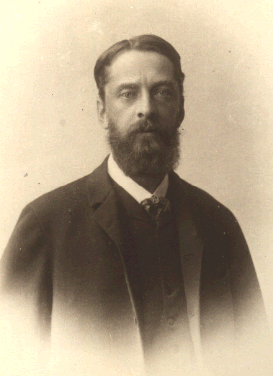
The opportunity cost theory is very important. It comes from his book Theory of Social Economy (1914). Wieser created the term "opportunity cost" and studied it in detail.
Opportunity cost was part of a big debate in the early 1900s. Economists who followed Alfred Marshall in England disagreed with the Austrian School economists, led by Friedrich von Wieser. The debate was about:
- English View: Cost was a technical idea, meaning the spending needed to make something.
- Austrian View: Cost was a result of demand. Demand would decide how much was produced, based on what buyers were willing to pay. Since demand depends on buyers, utility would decide a thing's cost, not just technology. Opportunity cost meant what a buyer would give up by choosing one option.
The main point of opportunity cost is that it only makes sense if the opportunities are limited. If you have many choices, you can calculate the opportunity cost of choosing one. But you can't calculate a universal opportunity cost that includes every possible option. This led some economists to limit economics to situations with limited resources.
How it's Used
- Wieser created the term "opportunity cost."
- He helped shape the theory that showed the difference between accounting cost (the cost of making something) and economic cost (the cost of making something plus the opportunity cost of not being able to get something else).
Monetary Theory
Wieser also developed a theory about money. He was inspired by Carl Menger's studies on currency. Wieser used the idea of marginal utility as the basis for his money theory. At first, his theory was not accepted. However, his student Ludwig von Mises later built upon Wieser's ideas to create his own complex theory of money.
Wieser also studied how changes in the value of money affect the relationship between the natural economy (where goods are exchanged directly) and the monetary economy (where money is used).
How it's Used
- His ideas were later used to study the quantity theory of money.
- He provided a new theory of money within the Austrian School. He also studied how different things could influence the value of money.
- His work provided a basis for his student Ludwig von Mises's important studies on money.
Social Economics
In his later years, Wieser studied Sociology. This led to his 1914 book, Theory of Social Economy, which included his opportunity cost theory. His last book, The Law of Power (1926), was a big sociological study.
Wieser tried to explain social relationships and forces by studying history. He concluded that economic forces played a big role in how society changed. Even though he was interested in group goals like economic well-being, Wieser focused on the individual. He did not support collectivism. He took a more liberal stance and showed the key difference between social economics in general and socialist economics.
Social economy (in German, Gesellschaftliche Wirtschaft) sees all of humanity as an ideal economic subject. It compares this to nature. This means that ideas about conflicts of interest or economic justice become less important. Wieser wrote: "This broad economy is guided by a single mind. It works perfectly because a smart and careful mind guides it."
For Wieser, individuals are the source of all decisions. These decisions are made with certain limits. Institutions define these limits on individual choices. These ideas affected his views on political economy, such as:
- Regulating companies: He thought that companies with imperfect competition should be regulated if they were losing capital benefits.
- Progressive taxation: This is when people with higher incomes pay a higher percentage in taxes. He believed it should be based on the idea of decreasing marginal utility. This means each new tax adds less utility.
- Government's role in public goods: Wieser said the state has a duty to provide public goods. These are things like roads or parks that everyone can use. His student Friedrich Hayek later used this idea.
- Helping workers: He thought the government should help balance power between companies and unions to benefit workers. Otherwise, workers might only earn what their marginal productivity allows.
These conditions, where resources would be used to get the most value, describe his model of an ideal economy. He called this "social economics" in his book Theory of Social Economics. He used this ideal model to measure how well government actions worked in the market economy.
Wieser's Social Economics is like a socialist economy. In this economy, to get more productivity, scarce resources are given out by a powerful, kind planner. This planner knows exactly what individuals in society want and need. Everyone has the same tastes and needs, and they all get the same income. Also, everyone follows the planner's directions without question.
Wieser and New Liberalism
Some people call Wieser a "neoliberal." This term was used by Ludwig von Mises to describe socialists who pretended to be liberals. Mises later called them "pseudoliberals." Mises also applied the "neoliberal" label to supporters of the new subjective theory of value, including Carl Menger and Wieser.
When Carl Menger, Eugen von Böhm-Bawerk, and Wieser started their careers, they didn't focus on economic policy. They especially didn't focus on rejecting government involvement, which was promoted by classical liberalism. Their main goal was to create a strong economic theory. Following Menger, Wieser and Böhm-Bawerk disagreed with the government's policies of intervention. They argued that only a free market could lead to more efficient economic and social development.
Wieser believed he could help bring back liberal policies. He did this by explaining his economic ideas in books and articles. He also taught these ideas as a university professor in Prague and Vienna. His positions in Austrian ministries also allowed him to support more liberal economic policies. However, his liberal views made him different from British economists of his time. He rejected simple classical and neoclassical models that didn't consider things like monopolies or economies of scale. Wieser wrote: "Chaos [meaning classical liberalism] has to be replaced by a system of order."
Wieser did not believe in fixed, unchanging truths or that things happen for a specific purpose. Unlike the German historicist school, he developed a logical method. This method used both deduction (starting with general rules to reach specific conclusions) and induction (starting with specific observations to find general rules). He believed that economics, like Mathematics and Logic, is based on ideas rather than on observation like other sciences. He thought that social developments are always changing, with no fixed rules. This makes it hard to find historical laws or make predictions. This was a key difference between the Austrian School and the German School.
Wieser wrote little about his methods. He said that economics is a type of applied psychology. He believed that economics and sociology are similar because both try to improve human society. He promoted the idea of utility, which describes the usefulness of each good to each person. Both Eugen von Böhm-Bawerk and Wieser tried to look at subjective factors in an objective way. They moved away from ideas that believed in an objective superhuman or theories where subjective elements couldn't be measured objectively.
His Legacy
Joseph Schumpeter highlighted Wieser's unique ideas. He said: "There is hardly another author who owes as little to other authors as Wieser, fundamentally to none except Menger and to him only a suggestion – with the result that for a long time many fellow economists did not know what to do with Wieser's work. Of his edifice, everything is his intellectual property, even where what he says has already been said before him."
Works
- English Translation: Natural Value, 1893, translated by Christian A. Malloch, edited with an introduction by William Smart.
- Theorie der gesellschaftlichen Wirtschaft, 1914
- English translation: Social Economics, 1927, translated by A. Ford Hinrichs, with a preface by Wesley Clair Mitchell. Full Text
- Das Gesetz der Macht, 1926;
- English translation: The Law of Power, 1983, translated by W.E. Kuhn, edited with an introduction by Warren J. Samuels Full text
- Die österreichische Schule und die Werth Theorie (The Austrian School and the Value Theory), 1891.
- "The Austrian School and the Theory of Value", in The Economic Journal, Volume 1, 1891 (in
 Wikisource).
Wikisource). - Die Wert Theorie (The Value Theory), 1892.
- Die Theorie der städtischen Grundrente (The Theory of Urban Ground Rent), 1909.
- Das Wesen und der Hauptinhalt der theoretischen Nationalökonomie (The essence and the main content of theoretical economics), 1911.
- Das geschichtliche Werk der Gewalt (The History of State Power), 1923.
- Die nationale Steuerleistung und der Landeshaushalt im Königreiche Böhmen: Antwort auf die Erwägungen (The National tax services and the state budget in the kingdom of Bohemia: Response to the considerations), 1923.
See also
 In Spanish: Friedrich von Wieser para niños
In Spanish: Friedrich von Wieser para niños
- List of Austrian scientists
 | May Edward Chinn |
 | Rebecca Cole |
 | Alexa Canady |
 | Dorothy Lavinia Brown |


